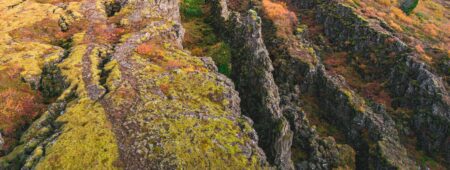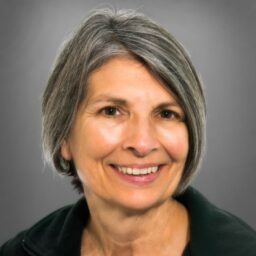
Freedom to Explore the Unknown
As a professor of geology and geophysics for more than 40 years, Hertz Fellow Joann Stock has traveled the globe studying plate tectonics. Her work has taken her from the Gulf of California to the South China Sea to Antarctica, and beyond—recent research includes studying the tectonics of Earth’s “twin” planet, Venus.
And yet, she says, there’s still so much more to explore.
“One thing that’s really interesting about earth science, and this is something I was aware of even as an undergrad, is that you don't actually have to know very much to do something significant, because so much is unknown,” Stock said.
For Stock, the opportunity to explore the unknown had an immediate impact on shaping her career. As a young undergraduate at the Massachusetts Institute of Technology (MIT), she began working with Professor Peter Molnar on microseismicity projects in Greece and Peru.
“I was working on a project that my professor said needed to be done because no one had done it yet,” she said. The subject matter was the relative plate motions of the Antarctica, Pacific, and Australia plates, going back in time. No one had calculated updated reconstructions or uncertainties with the available data. Stock’s analysis yielded a range of possible finite rotations describing the relative positions of the plates since the Late Cretaceous period.
“Because no one studied it before, I could make a significant contribution and get a publication out of it, which is how I got my master’s degree,” Stock said.
Stock earned her bachelor’s and master’s degrees in geophysics concurrently in 1981 from MIT. The same year, she was awarded a Hertz Fellowship to pursue her PhD at Cornell University.
The flexibility provided by the fellowship was a key factor in the ultimate trajectory of her career. After a year at Cornell, Stock decided the school wasn’t the right fit for her and took leave from her studies to work as a geophysicist for the US Geological Survey in Menlo Park, California. After a few years, she returned to MIT for her doctorate, switching from geophysics to geology. She received her PhD in 1988.
“In retrospect, it was really, really good that I had the flexibility to switch schools. I would not have been able to do that under other circumstances. It was one of the big benefits to my career that I had the chance to change schools and do something else, to increase my knowledge in different areas, but still in earth science.”
The fellowship also provided the flexibility to choose a project that was solely her creation, field mapping structural geology and volcanic stratigraphy in northwestern Mexico.
“The Hertz Fellowship was hugely helpful because it gave the flexibility to actually design my own PhD, which I would not have been able to do otherwise,” she said.
While doctoral students are typically beholden to their advisor when it comes to their research, the Hertz Fellowship eliminated that restriction. “My PhD advisor had nobody else working in Mexico. He had nobody else working on volcanic rocks, which is what I ended up doing. It was really helpful that I could be so flexible. It was a wonderful experience all around.”
Through her dissertation work, she initiated collaborative relationships with researchers and educational institutions in Mexico that continue in her work today. Her field mapping projects in Baja California and Sonora are ongoing, and she has supervised the work of numerous PhD students in the region over the years.
In all of Stock’s research, from sea floor topography to measuring the soil gas accumulation of carbon dioxide around earthquake faults to studying the tectonics of Venus, advancements in technology keep opening pathways to new exploration.
“Technology has improved tremendously since I started my career. For example, GPS didn’t exist when I was starting out. I’ve had continual opportunities to propose new research that takes advantage of new technology to better understand the behavior of the earth,” she said.
The need for innovative research along with the quality of her Hertz Fellowship experience motivates Stock to give to the Hertz Foundation today.
“The flexibility the Hertz Fellowship provides is one of the best ways to encourage students in STEM to explore new ideas,” Stock said. “Working at a university, I’m not nearly up to the level of what people in industry can donate, but I think it's important to give what I can. I see the current crop of students, the fellows we've had and currently have at Caltech, and they’re just amazing people. They do wonderful, innovative research on things that didn’t even exist 20 years ago. The more we can encourage people to follow new avenues of research and explore what else they can do to improve society, the better.”
